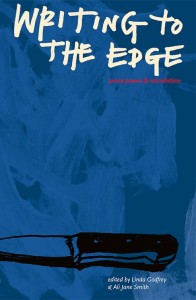 1. What inspired you to write the prose poem/microfiction which will appear in Writing To The Edge?
1. What inspired you to write the prose poem/microfiction which will appear in Writing To The Edge?
I’d been to see an exhibition of works by Kenyan-born, New York-based artist Wangechi Mutu at the MCA. It featured the installation Exhuming Gluttony: Another Requiem, which had wine bottles oozing liquid onto a large wooden table in a room lined with animal skins. At the time it didn’t really move me but it must have wormed its way into my consciousness. Soon after, the pelts arrived on the page along with the odd character who found them so arresting.
I knew I wanted to cover a lot of territory/time in this piece but not give away too much. I wanted to hint at an intriguing backstory and to create a lone male with a psychologically strange narrative voice. I’d been reading So Long, See You Tomorrow by William Maxwell, which has been called a “masterpiece of narrative compression”, so this also seemed a great place to find inspiration for writing micro-fiction.
2. Tell us about your process. (Do you start sparse and widen out, or do you write down every possible association and cut back? Do you research the subject matter you are writing about? Is it pure intuition?) Take us through an example if you want.
If there’s a pattern to my writing process I’m too enmeshed to be able to identify it. However, I can tell you what happened with “Pelts”. After a year of upheaval and travel I was trying to form the habit of climbing into my loft every morning and writing whatever came up for me. The guts of this strange piece appeared in one sitting. I found it again a month or two later and worked on it pretty intensely — finessing the language and trying to feel my way into the older, male narrator I had created. Researching how animals are shot and pelts are dried and hung was a grisly and essential part of the process.
3. What advice do you have for other writers? (About the first or last line? About how to choose the title? Do you follow any rules?)
The girl died. What a great first line — and even better when it’s read aloud by its Irish creator Anne Enright. She took the “S” arm off her typewriter so she wouldn’t be able to spell his name. This is another stunner by the superb Australian writer Josephine Rowe.
Advice? Write. Do it. Keep doing it. Cough it up. Let it rest. Go back and look at it. The secret ingredient is stick-ability. If you’re sick of sitting in the chair, walk. Take the piece you’ve been working on (in your mind) with you. Let it wash through you. Feel its rhythm.
Inspiration is capricious — so don’t be without pen and paper when it strikes.
Read constantly. It will feed you on your journey through fire and flood, snow and desert, grief and delirium. It’s better than rules. Reading oils the wheels, tamps down the fear, cultivates your ear for cadence and helps you to find the courage to be the writer you desire to be.
4. Who or what inspires your writing?
My writing partner and good friend Catherine recently had a story called “Hospital Auxiliary” published in the Hunter Writers Centre anthology Grieve. One sentence from her story keeps marauding me: “We are all auxiliary now, their faces say — ancillary, supplementary, secondary to pain.”
Ouch.
Lately, the writers Geoffrey Wolff, Louise Erdrich, Kate Atkinson, Mark O’Flynn, Janet Frame, Louise Gluck and Lloyd Jones have also worked their inspirational magic. And yet I also agree with AL Kennedy who believes inspiration is mysterious: “Inspiration originally referred, as you will know, to the idea of being filled with divine spirit, some kind of transforming, burning Otherness, the sense of having an idea, a thought, a need, breathed straight into your lungs.” That’s the hit I’m hoping for — the thrill of feeling mystified about who these characters are and where they’re from. Luring them into the light so they might reveal to me what’s going on.
5. Tell us what you do if you haven’t written anything in a while and you want to get started writing again? Could you share your favourite writing exercise with our readers?
I still don’t have a sure-fire system to quell the panic I feel if I haven’t written for a while. So my wisdom about getting started after a fallow period is pretty thin. Breathing is important! So is picking up your pen and pretending you aren’t really writing but just foozling. Sometimes this crazy mind game is enough to get you back on track.
My favourite writing exercise these last few weeks is from Dear Writer Revisited, published late last year by Spineless Wonders. Its author, Carmel Bird, suggests that each night you write down three things from your day that strike you as interesting. It’s simple but it means you have to pay attention — to comprehend and convey what the world around you is really like. Like a pianist practising scales, this exercise develops muscle memory. Who knows: The words you lay down as you practise might be the bones from which a story can be fleshed out later. It’s worth a shot.

